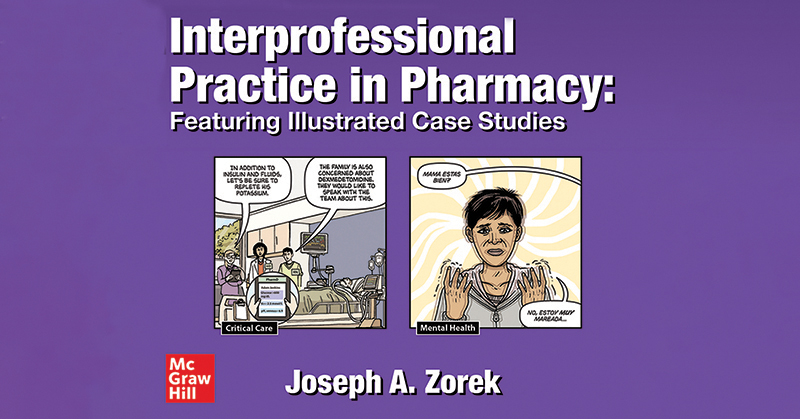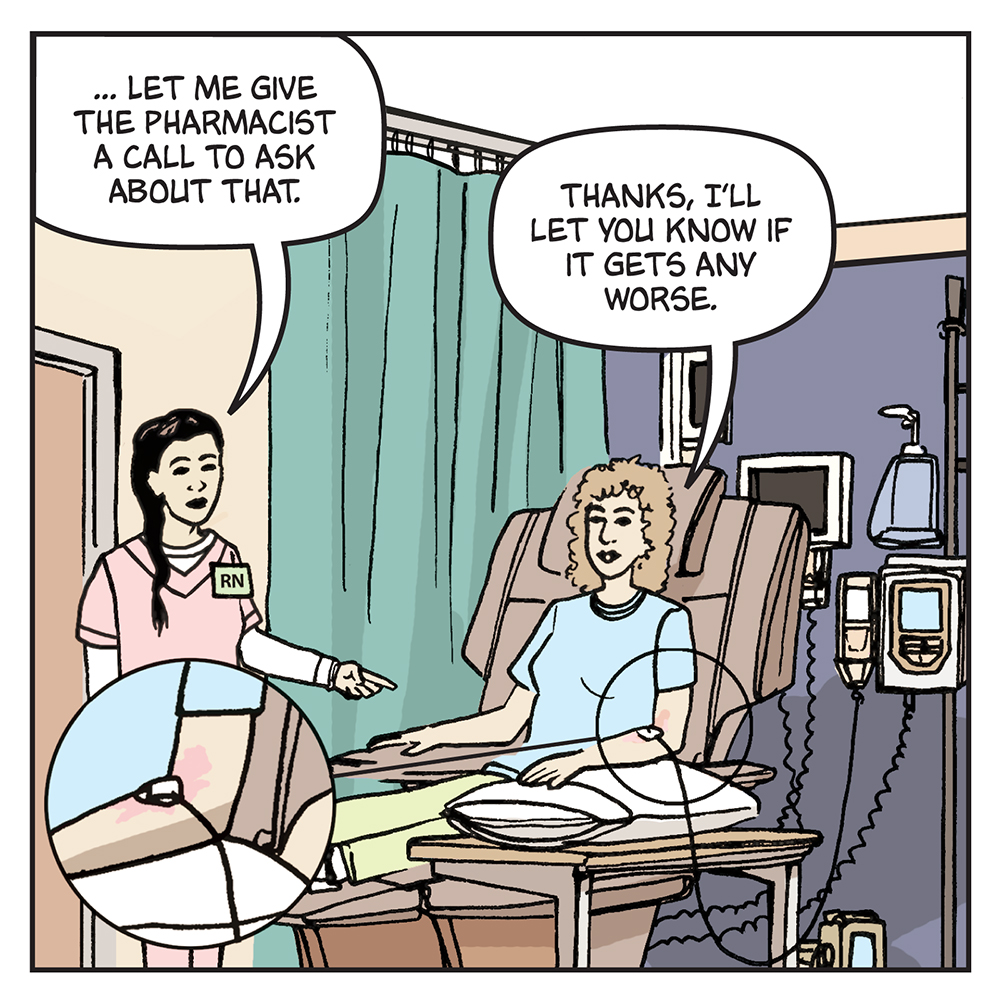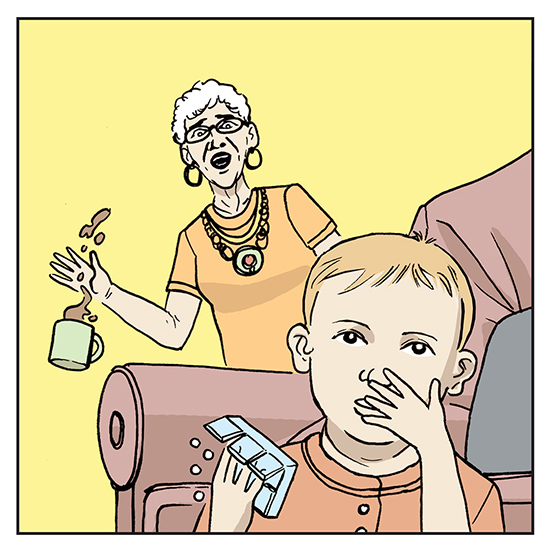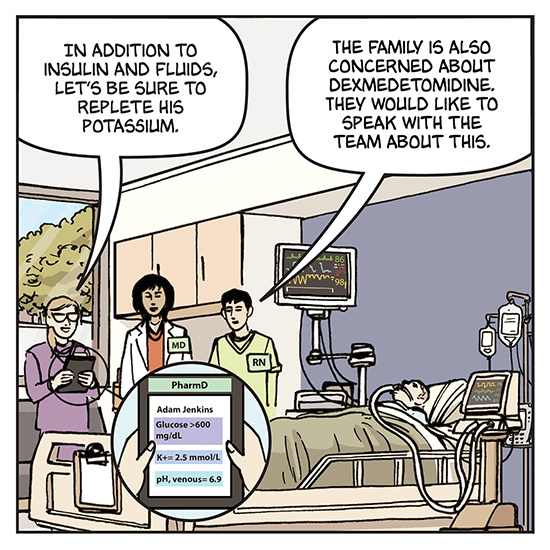Illustrating the Versatility of Pharmacy
TTUHSC residency alumni Joseph Zorek’s new book finds unique ways to capture the interest of young readers

The new vision at Texas Tech University Health Sciences Center (TTUHSC) aims to transform health care through innovation and collaboration. Our vision is not only about the biggest names in science and leadership—everyone plays a vital role. This series seeks to highlight innovative individuals and groups that work together to create transformative ideas and shape health care, revealing what makes this university extraordinary.
The journey that led Joseph A. Zorek, PharmD, BCGP, FNAP, to his current position at The University of Texas Health Science Center at San Antonio (UT Health San Antonio) has not been a traditional one. It is only fitting, therefore, that his new book, Interprofessional Practice in Pharmacy: Featuring Illustrated Case Studies, is anything but a traditional textbook.
First Experiences in Education

Now a tenured associate professor at UT Health San Antonio’s School of Nursing and
the director of the university’s quality enhancement plan—Linking Interprofessional
Networks for Collaboration (LINC)—Zorek started his professional career as an educator:
first teaching English in Germany as a Fulbright Scholar, then high school psychology,
sociology and world history in Oak Lawn, Illinois, near his home town.
“I started thinking about changing careers pretty quickly,” said Zorek. “Influenced
by my Fulbright experience, I felt compelled to be part of a larger conversation.
I wanted my work to have national and international impact, in other words, in addition
to local impact.”
When Zorek first entertained a future in health professions, he discovered an interest
in pharmacy for both personal and practical reasons. Since his mother was a nurse,
Zorek was raised with a respect for the power of medications. The most compelling
reason, Zorek explained, was about projected opportunities in the field.
“When I decided to pursue pharmacy, the PharmD degree was a relatively new national
standard, and the education and training of PharmDs seemed poised to have a major
impact on healthcare,” Zorek said. Having found a new career path, Zorek set off to
pursue pharmacy at the University of Illinois at Chicago (UIC).
Once a Teacher, Always a Teacher
While earning his PharmD at UIC, Zorek met a professor named Nick Popovich, who became
his advisor. A man who has built a national reputation as an educational scholar in pharmacy, Popovich also served as the President of the
American Association of Colleges of Pharmacy.
“Nick helped me realize that education was a calling, and he encouraged me to pursue
a career in academic pharmacy,” said Zorek. “Having sworn off education when I left
teaching high school to pursue pharmacy, I can promise you that the joke is not lost
on my family and friends that I left a career as a teacher to pursue a career as a
teacher,” Zorek jokingly explained.

From Relapse: An Illustrated Case Study
Story by Natalie S. Schmitz & Joseph A. Zorek
Illustration by George Folz, Copyright 2020 McGraw-Hill Education
As the next step in pursuit of that career, Zorek chose residency training at Texas Tech University Health Sciences Center (TTUHSC).
“I chose TTUHSC for a variety of reasons, but one of the most compelling was that
the program in Amarillo had a heavy emphasis on teaching and scholarship,” Zorek said.
During his time at TTUHSC, Zorek began developing expertise in interprofessional practice
and education (IPE)—a field that was poised for impact and growth and fit naturally
with his background in education and social science.
“Incredible mentors at TTUHSC, especially Cindy Raehl and Eric MacLaughlin, really
helped jumpstart my scholarship,” said Zorek. “A full decade on, the desire to create
large-scale impact—which led me to pharmacy in the first place—has materialized through
my work in IPE.”
After completing his residency at TTUHSC, Zorek joined the faculty at the University
of Wisconsin—Madison, where he worked to expand IPE opportunities for students and
shape health professions education through creative scholarship. From there, he was
recruited by several universities to lead campus-wide IPE initiatives, and currently
leads LINC, UT Health San Antonio’s university-wide effort to advance IPE.
Since a nontraditional approach to pharmacy provided him with a fresh perspective,
Zorek was able to combine his knowledge of IPE and the pharmacy profession into one
instructive body of work. Zorek’s new book stands out in many ways—providing not only
a straightforward approach to the pharmacy profession, but offering uniquely illustrated
case studies that capture readers’ attention and invite further exploration.
Drawing an Interest in Pharmacy Practice

From Accidental: An Illustrated Case Study
Story by Jessica M. Bergsbaken & Joseph A. Zorek
Illustration by George Folz, Copyright 2020 McGraw-Hill Education
Interprofessional Practice in Pharmacy: Featuring Illustrated Case Studies, published this year, is described by McGraw-Hill as an “accessible, in-depth exploration
of pharmacists working to advance the safe and effective use of medications.” Aimed
at prospective and early learners in pharmacy, Zorek explains that it’s the purpose
of the book that truly sets it apart. While the text delves deeply into content related
to drug therapy, it is intended as a career exploration and inspiration guide.
“It's everything I learned during my transition from non-pharmacist to pharmacist
all wrapped up in a single book,” said Zorek. “This profession is expansive… and the
earlier students learn about these opportunities, the better prepared they will be
to find a career path that will sustain them.”
The concept of an illustrated case study occurred to Zorek many years before his book
took shape.
“Case studies are so ubiquitous that, in my opinion, they've grown stale,” said Zorek.
“During pharmacy school, residency, and as a faculty member, I was just bored with
the approach—and I had a hunch that my students were, too.”
Zorek’s own daughters helped spark the idea to enliven the case study methodology.
“When my daughters were about 6 and 8 years old, they were obsessed with graphic novels,”
explained Zorek. “One day, picking up all of these graphic novels to help put them
back on their shelves, it occurred to me that there might be an opportunity to tell
case studies through professionally rendered art.”
This once-fleeting idea actualized about a year later, during preparations for an
interprofessional education event involving pharmacy, medical and nursing students.
“Our planning team wanted to use a case study, so the opportunity to experiment with
illustrations emerged. I was also fortunate to have some funds available to hire a
professional artist named George Folz,” said Zorek. “The students loved that first
illustrated case, and at that moment I knew that this was an incredible way to communicate
complex concepts in health care.”
Now, Zorek hopes this method will help clarify details within the profession and surprise
those who might have originally passed on the opportunity to pursue pharmacy as a
career.
Collaboration in the Pharmacy Profession
According to Zorek, an essential part of this book is the interprofessional elements
of pharmacy practice. The title intentionally draws attention to this aspect of the
text.

From Type 1: An Illustrated Case Study
Story by Chloe R. Schmidt & Joseph A. Zorek
Illustration by George Folz, Copyright 2020 McGraw-Hill Education
“Interprofessional practice in pharmacy is critical, especially for millennials and
gen-Zers who tend to naturally value and expect connections, collaborations, and for
teams to be part of their work and careers,” said Zorek. “A lot of innovation in IPE
is driven by pharmacy, and I believe this is because medications are like vectors
that connect pharmacists with numerous different health professionals.”
Zorek clarified that there are many meaningful opportunities for pharmacists to help
improve the use of medications, not just with patients and their families, but with
other health professionals as well.
“One of the myths about pharmacy is that pharmacists work in silos, disconnected from
other health professionals,” said Zorek. “This couldn't be more untrue in 2021. It's
virtually impossible to practice pharmacy without interprofessional teamwork and collaboration.”
Zorek’s book busts this myth using an innovative approach that hopes to inspire the
next generation of pharmacists.
Related Stories
Celebrating Veterans: TTUHSC’s General Martin Clay’s Legacy of Service and Leadership
From his initial enlistment in the Army National Guard 36 years ago to his leadership in military and civilian health care management roles, Major General Martin Clay’s career has been shaped by adaptability, mission focus and service to others.
Texas Tech University Health Sciences Center School of Nursing Named Best Accelerated Bachelor of Science in Nursing Program in Texas
The TTUHSC School of Nursing Accelerated Bachelor of Science in Nursing (BSN) program has been ranked the No. 1 accelerated nursing program in Texas by RegisteredNursing.org.
TTUHSC Names New Regional Dean for the School of Nursing
Louise Rice, DNP, RN, has been named regional dean of the TTUHSC School of Nursing on the Amarillo campus.
Recent Stories
The John Wayne Cancer Foundation Surgical Oncology Fellowship Program at Texas Tech University Health Sciences Center Announced
TTUHSC is collaborating with the John Wayne Cancer Foundation and has established the Big Cure Endowment, which supports the university’s efforts to reduce cancer incidence and increase survivability of people in rural and underserved areas.
TTUHSC Receives $1 Million Gift from Amarillo National Bank to Expand and Enhance Pediatric Care in the Panhandle
TTUHSC School of Medicine leaders accepted a $1 million philanthropic gift from Amarillo National Bank on Tuesday (Feb. 10), marking a transformational investment in pediatric care for the Texas Panhandle.
Texas Tech University Health Sciences Center Permian Basin Announces Pediatric Residency Program Gift
TTUHSC Permian Basin, along with the Permian Strategic Partnership and the Scharbauer Foundation, Feb. 5 announced a gift that will fund a new pediatric residency.
